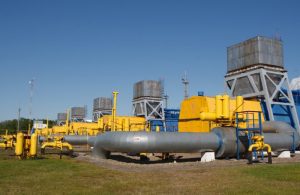
The transit of natural gas from the Russian Federation through Ukraine in January-September 2020 decreased by 38.6% (by 28.3 billion cubic meters) compared to the same period last year – up to 45 billion cubic meters, head of the Operator of the Gas Transmission System of Ukraine (GTSOU) Serhiy Makohon said on his Facebook page.
According to him, the forecast for transit from Russia through the Ukrainian gas transportation system by the end of the year is 55-56 billion cubic meters.

Crude oil transit through Ukraine by pipelines to European countries and Belarus in January-September 2020 increased 5.5% (by 517,200 tonnes) compared to the same period in 2019, to 9.885 million tonnes, according to the data of JSC Ukrtransnafta.
The volume of oil transportation to refineries of Ukraine during this period amounted to 1.911 million tonnes, which is 8.7% (153,600 tonnes) more than in January-September 2019. Including oil transportation along the Odesa-Kremenchuk pipeline amounted to 839,000 tonnes (a rise of 32.2%).
Thus, in the first nine months of this year, the share of transit volume of the total oil transportation (11.796 million tonnes) amounted to 83.8%, the share of pumping to the country’s refineries – 16.2%.
In September 2020, oil transit through Ukraine by pipeline transport decreased 6.7% (by 90,200 tonnes) compared to the same month last year, to 1.255 million tonnes.
Pumping to Ukrainian refineries last month decreased 13.6% (by 32,100 tonnes),to 204,000 tonnes, including transportation of Ukrainian oil amounted to 112,100 tonnes, Azerbaijani oil – 76,800 tonnes, WTI oil – 15,100 tonnes.

Oil transit through Ukraine by pipeline to European countries and Belarus in January-August 2020 increased by 7.6% (by 607,500 tonnes) compared to the same period in 2019, to 8.630 million tonnes, according to data from JSC Ukrtransnafta.
The volume of oil transportation to refineries of Ukraine during this period amounted to 1.707 million tonnes, which is 12.2% more than in January-August 2019. In particular, oil transportation along the Odesa-Kremenchuk route amounted to 747,100 tonnes.
Thus, for the eight months of this year, the share of transit volume in the total transportation of oil (10.337 million tonnes) amounted to 83.5%, the share of pumping to the country’s refineries 16.5%.
In August 2020, oil transit through Ukraine by pipeline decreased by 9.2% compared to the same month last year, to 1.262 million tonnes.
Pumping to Ukrainian refineries last month decreased by 0.9%, to 225,600 tonnes. In particular, transportation of Ukrainian oil amounted to 117,100 tonnes, Azerbaijani 43,000 tonnes, and American some 65,400 tonnes.

Naftogaz Ukrainy Executive Board Chairman Andriy Kobolev estimates the proceeds from PJSC Gazprom for the transit of Russian gas through the gas transmission system (GTS) of Ukraine at about $2 billion in 2020.
“I think this year the figure will be close to $2 billion,” he told journalist Yanina Sokolova on the YouTube channel on Tuesday evening.
The head of Naftogaz said that the “take or pay” principle enshrined in the contract during the economic crisis is important for the country in terms of obtaining a guaranteed income from the provision of transit services.

The Ukrainian government has made changes to the list of exceptions for foreigners who are not denied entry in the country, the Ukrainian Foreign Ministry said on Facebook.
The new rules scrap the provision allowing foreigners who are in transit on the territory of Ukraine to enter the country.
Exceptions from the entry ban are made for people who are spouses, parents, children, or grandparents of a citizen of Ukraine.
Children are given legal status before they become full of age.
If people are sent to Ukraine to study, they only have to go to higher education establishments.
According to earlier reports, the Ukrainian government closed the borders to foreign citizens until September 28.
The restriction did not affect people who have residence permits, are members of international and humanitarian missions, who enter the country in transit, who drive cargo road vehicles, are instructors of NATO states, culture figures, people who have invitations from culture establishments, and also some other categories of people.

Transit of natural gas through the gas transmission system (GTS) of Ukraine in January-August 2020 amounted to 34.8 billion cubic meters., which is 42% less than in the same period in 2019 (59.6 billion cubic meters).
According to the report of Gas Transmission System Operator of Ukraine LLC (GTSOU), 32.4 billion cubic meters of gas were transported in the western direction (Slovakia – 23.9 billion cubic meters, Hungary – 5.9 billion cubic meters, Poland – 2.6 billion cubic meters), which is 36% less than in January-August-2019, in the trans-Balkan region – 2.3 billion cubic meters (Moldova – 1.87 billion cubic meters, Romania – 0.46 billion cubic meters), which is 73% less than last year in this direction.
Despite a significant drop in transit compared to last year, Gazprom (Russia) fully pays for the transit capacity booked for this year (178 million cubic meters per day), which it used by 80% in January-August.
“For its part, GTSOU fulfills all daily requests and will continue ensuring uninterrupted gas transportation to European countries in the future,” the company said.